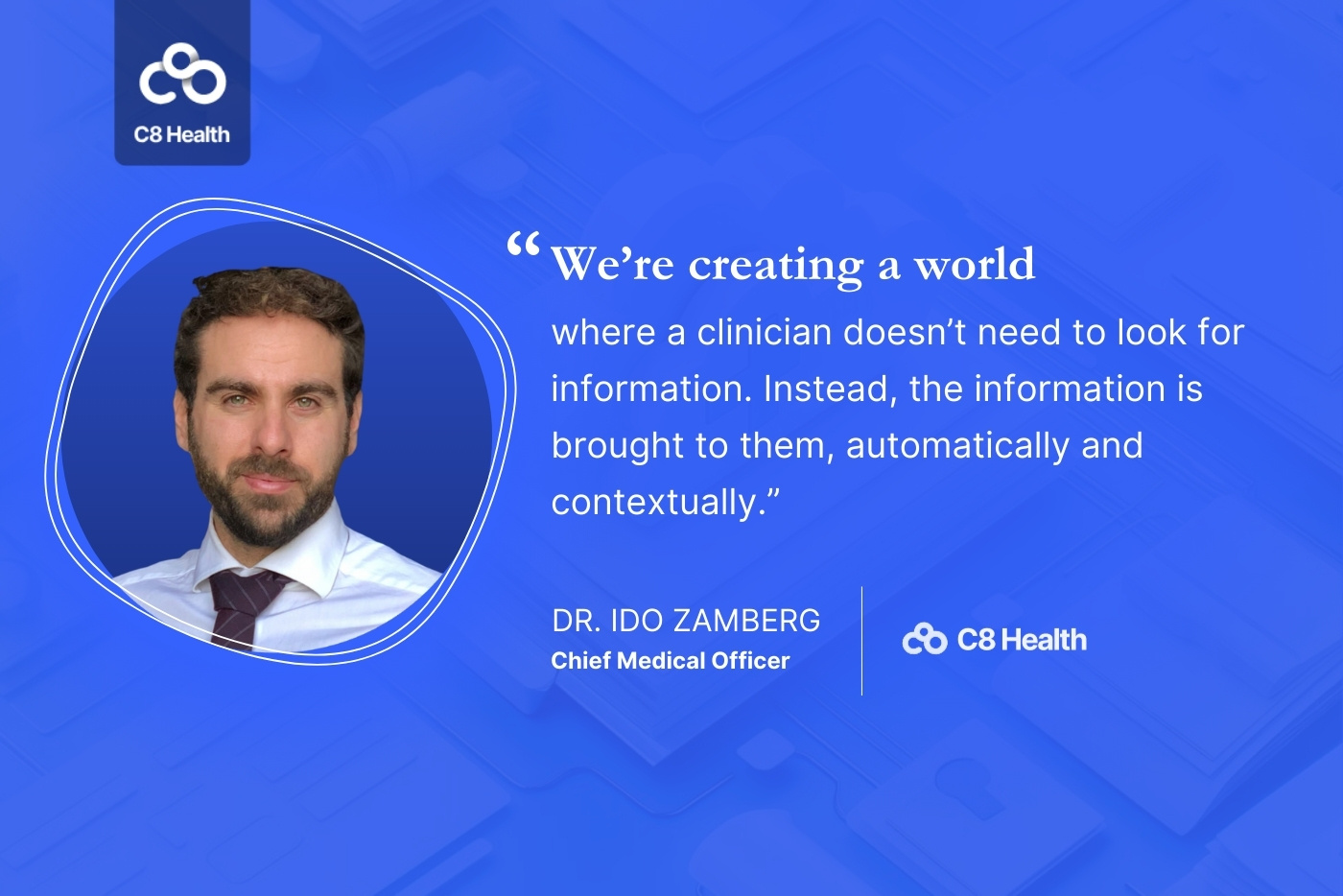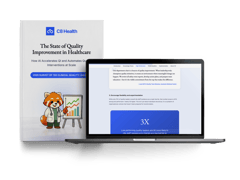
Bridging the Knowledge Gap in Pediatrics: A Conversation With Becker’s Healthcare
Knowledge management is critical to any department delivering effective patient care, and pediatrics is no different. Pediatricians treat a wide array of patients and often face complex scenarios where quick access to accurate, context-specific information that has been adapted to their point of care can mean the difference between life and death.
In conversation with Becker's Healthcare, C8 Health’s Chief Medical Officer, Dr. Ido Zamberg, shared his perspectives on the current challenges of knowledge management in pediatrics. With expertise in medicine and computer science, he offered unique insights into knowledge management's role in improving care delivery, reducing clinician burnout, and improving pediatric efficiency.
Key Takeaways
- Effective knowledge management is key for the implementation of best practices and care consistency: Make clinical guidelines and best practices accessible to ensure consistent care delivery and minimize risks associated with fragmented knowledge systems.
- Generative AI, when used safely and thoughtfully, is a powerful tool to streamline access to vetted best practices: AI can deliver relevant, task-specific information to clinicians, improving decision-making and reducing the time spent searching for critical resources.
- Easy access to knowledge means better wellness for clinicians: Simplify access to trusted, up-to-date knowledge to reduce time spent searching for information, and reduce administrative burdens of managing, updating and disseminating knowledge across care teams.
- Embrace an open knowledge culture: Invest in modern knowledge systems to support operational efficiency, eliminate care discrepancies, and empower clinicians to address patient needs effectively.
1. Reduce Pediatric Care Inconsistency Through Access to Best Practices
Dr. Zamberg emphasized the critical need for healthcare organizations to make clinical knowledge easily accessible to reduce variability in care. Fragmented knowledge systems often hinder care consistency, leading to wasted resources and risks to pediatric patient outcomes.
“From a clinician perspective, we often find ourselves working in different environments…each of these settings has a unique set of best practices based on specific local expertise, culture, staff, and resources. Yet access to these local guidelines is often severely limited. It’s both dangerous and wasteful, resulting in unwarranted variability in care.”
Dr. Zamberg shared an example to illustrate the life-saving potential of effective knowledge management during a prehospital emergency. He described an incident where a child was in critical condition, and every moment mattered. At that moment, Dr. Zamberg relied on C8 Health.
"My ability to reach out to my pocket, open our platform, and guide myself with age and weight-based pediatric dosages…completely saved that baby’s life."
The ability to instantly access accurate, context-specific information allowed Dr. Zamberg to make rapid, informed decisions without the delay of searching through complex manuals or consultations. Such immediate access to actionable knowledge underscores the potential of tools like C8 Health to empower clinicians, reduce response times, and ultimately improve patient care during critical moments.
Our latest report, The State of Knowledge Management in Hospitals, covers how collaborative knowledge management systems can improve and impact patient care. Download it to learn more
2. Leveraging Generative AI to Streamline Access to Knowledge
Dr. Zamberg also explained how artificial intelligence can play a transformative role in delivering timely, context-specific information to clinicians. He explains how, when implemented properly, AI tools can tailor knowledge to specific tasks and clinical settings.
“By connecting to a pediatric surgeon's schedule, [AI systems] can identify that [a patient is] scheduled for a tonsillectomy and automatically bring up relevant guidelines — like hemorrhage protocols, antimicrobial prophylaxis, or parent-asleep policies — before they even enter the operating room. We’re creating a world where a clinician doesn’t need to look for information. Instead, the information is brought to them, automatically and [contextually.]”
By eliminating the time clinicians spend searching for information, AI boosts productivity and reduces cognitive load. This improved efficiency means clinicians can allocate more time to patient interaction, critical thinking, and personalized care, ultimately enhancing the quality of the healthcare experience.
3. Streamline Knowledge Access to Reduce Burnout
Effective knowledge management plays a significant role in increasing clinician wellness. As Dr. Zamberg explains, it helps alleviate the stress associated with searching for vital knowledge during high-pressure situations by providing instant access to critical, context-specific information.
“Clinicians can quickly access their locally vetted best practices in seconds, trust that this information is relevant to their specific point of care, and know that it is up to date and not obsolete. This can have a major positive psychological impact on clinicians, reducing burnout and helping hospitals retain their staff.”
This not only eliminates time searching for knowledge but also unlocks a host of macro-level efficiencies that healthcare organization leaders care about deeply. The technology can eliminate the overhead of creating, updating and disseminating knowledge efficiently across care teams. Such tools empower healthcare professionals to deliver better care and support their mental well-being, reducing the risk of burnout and promoting retention.
4. Embrace an Open Knowledge Culture
As pediatric hospitals are often the first to adopt cutting-edge technology, Dr. Zamberg urged these institutions to prioritize knowledge management as a cornerstone of care innovation. Doing so ensures they are equipped to meet evolving challenges and maintain high standards of patient care. By embracing advanced knowledge systems, pediatric hospitals can foster a culture of continuous learning, minimize discrepancies in care, and empower clinicians to make informed decisions efficiently.
“No one is better positioned than pediatric clinicians to understand their patients’ pain points, problems, and needs. Knowledge management should be a priority for pediatric hospitals. Managing knowledge effectively is the key to eliminating unwarranted variability in care.”
Dr. Zamberg concluded that effective knowledge management is not just about technology but also about fostering a culture where information is shared openly and clinicians feel empowered to contribute to and access the collective knowledge base. By prioritizing these systems, pediatric hospitals can build a resilient and adaptable healthcare environment ready to meet the needs of both patients and clinicians.
Closing the Knowledge Gap with C8 Health
As healthcare evolves, pediatric hospitals must bridge knowledge gaps to ensure consistent, high-quality care. C8 Health offers a robust solution by integrating AI-driven knowledge management directly into clinical workflows, reducing care variability.
Ready to empower your clinicians and improve care consistency? Contact us to learn how we can help you transform your knowledge management.

